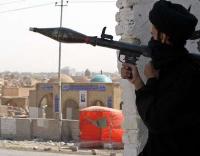Yemen government and Shiite rebels reach cease-fire
Yemen's government and Shiite rebels have reached a cease-fire in a three-year fight.

The deal, reached under mediation from Qatar, requires rebels to hand over their heavy weaponry to the government, a Yemeni security official said Saturday. The government agreed to release rebel prisoners, pay for the reconstruction of villages ravaged by the fighting and help displaced people return home, the official said on condition of anonymity because he was not authorized to speak to the media.
The Shiite rebellion began in Yemen's north in June 2004 when cleric Hussein Badr Eddin al-Hawthi ordered his followers to take up arms against the government. Al-Hawthi was killed in clashes later that year.
The rebels say the government is corrupt and too closely allied to the West. The government accused al-Hawathi of sedition, forming an illegal armed group and inciting anti-American sentiment.
Abdel-Malek al-Hawthi, the current rebel chief and brother of the slain leader, said the rebels had agreed to lay down their arms.
"We announce the halting of the fight and commitment to the articles of the agreement," al-Hawithi said in a statement faxed to The Associated Press.
A tribal clan leader, Abdul Bari Talhan, reached by phone in the northern region of Saada, said the fighting had stopped Saturday morning, with only celebratory gunfire heard.
"We welcome this agreement," Talhan said.
The area turned into a war zone after clashes erupted in late January between rebel fighters and thousands of government troops backed by tanks, artillery and helicopters.
The government call its actions an attempt to curb terrorism. Tribal leaders in the northern region say more than 30,000 residents have been displaced by the fighting.
Al-Hawthi has denied allegations that his group, known as the Young Faithful Believers, received funds from Libya or predominantly Shiite Iran.
Subscribe to Pravda.Ru Telegram channel, Facebook, RSS!


